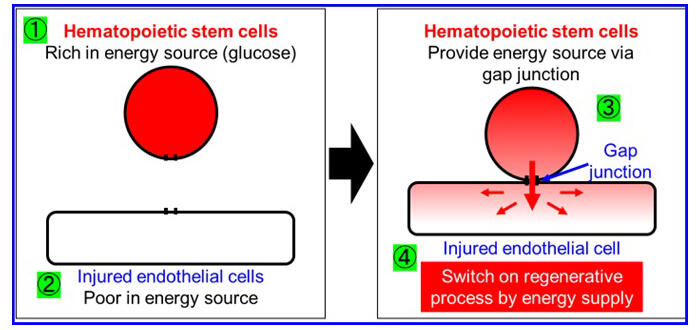A research group led by Professor Akihiko Taguchi of the Department of Regenerative Medicine Research, Institute of Biomedical Research and Innovation, Foundation for Biomedical Research and Innovation at Kobe, in collaboration with Fraunhofer Institute in Germany, the University of Warwick in the UK, and Shimane University proposed a novel mechanism of activation of neurogenesis in the hippocampus that may be a novel therapeutic target for Alzheimer's disease. These findings are expected to facilitate the development of dementia treatment and the advancement in anti-aging. The results were published in the November 21 issue of Neuroprotection.

Provided by the Foundation for Biomedical Research and Innovation at Kobe
As the existing proposed mechanism for dementia onset and the nature of aging has clear contradictions, the research group postulated that a decrease in energy production causes Alzheimer's disease and aging. Based on previous findings that dementia treatment and reversing aging are possible with hematopoietic stem cells and that a decreased number of hematopoietic stem cells in the peripheral blood due to aging is highly likely to be associated with impaired brain function and dementia onset, the research group focused on the correlation between the amount of energy production and Alzheimer's disease onset and aging.
Clinical trials of drugs that remove amyloid proteins (e.g., lecanemab) have demonstrated that the removal of amyloid proteins slows the progression of cognitive impairment only slightly. The progression continued after the removal.
The existing mechanism explains that the accumulation of harmful substances such as amyloid and tau causes dementia which results in brain functional impairment progressing. However, because dementia symptoms worsen despite the removal of harmful substances, it is highly likely that the accumulation of harmful substances, which was considered a cause, is actually a result of the disease process.
Moreover, hematopoietic stem cell transplantation in aged mice enhances neurogenesis in the hippocampus and improves cognitive function (new memory ability). Patients with fewer hematopoietic stem cells in the peripheral blood are poor in terms of cognitive function. The neurogenesis in the hippocampus is greatly reduced in patients with dementia. In view of this information, the activation of neurogenesis in the hippocampus is an appropriate therapeutic target for dementia.
In the novel mechanism, (1) although an enormous amount of energy is required to maintain complete cellular and tissue functions, energy production decreases with age, (2) aging begins when the energy reserve capacity reaches zero, representing the end of a period during which functionality can be fully maintained, and (3) energy production deficiency progresses further, resulting in greater difficulty eliminating harmful substances such as amyloid and tau, as well as difficulty in repairing mitochondrial and DNA damage, eventually leading to the progression of aging and dysfunction.
According to the novel mechanism, the end of the period during which the brain or body function can be fully maintained is a cause of dementia onset and aging; therefore, harmful substance s such as amyloid and tau accumulate along with mitochondrial and DNA damage.
Aging and regeneration are directed oppositely but share a common mechanism. A mechanism by which energy production decreases with age shares commonalities with one by which energy production increases via regenerative medicine. The proposed novel mechanism can also explain rejuvenation in parabiosis (2 animals surgically joined so they share a common circulatory system including the blood, vessels, and heart).
According to Taguchi, "This is like Columbus' egg in aging research! Science often advances drastically by shifting our perspective. Upon shifting our thinking, we began to clarify the fundamental mechanism of aging progression and develop antiaging treatment based on concrete science. I will be happy to collaborate with researchers in medicine as well as physics, chemistry, and the social sciences. I am willing to hear from anyone interested."
Journal Information
Publication: Neuroprotection
Title: Activation of neurogenesis in the hippocampus is a novel therapeutic target for Alzheimer's disease
DOI: 10.1002/nep3.25
This article has been translated by JST with permission from The Science News Ltd. (https://sci-news.co.jp/). Unauthorized reproduction of the article and photographs is prohibited.




